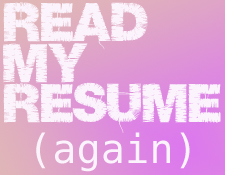
 The companies we work for are often so blinded by what we can do for them today, that they forget what we have done before. With the understanding that each of us is hired to help a company achieve their goals (not our own), I still believe that forgetting the past and only looking towards the future is a mistake.
The companies we work for are often so blinded by what we can do for them today, that they forget what we have done before. With the understanding that each of us is hired to help a company achieve their goals (not our own), I still believe that forgetting the past and only looking towards the future is a mistake.
The solution is simple. Re-read employees resumes every six months.
This exercise helps managers paint a more complete picture of the employees working for them. If organizations ignore the past, I propose that it creates several problems which can be detrimental to the employee-employer relationship.
Here’s why…
Valuble skills go unused. Years ago I interviewed for a job running the Intranet for a major public relations firm. With thousands of employees based around the world, they set up a database that profiled all of their workers skill sets. If Bob in London was looking for a Tagalog-speaking graphic designer to help him with a problem he was having in Photoshop, he could search the database and find someone to give him a hand. This system not only helps position employees for success, but it puts employee’s skills, hobbies and passions a mere click away.
Career-defining moments and events help us learn. By understanding where you came from and where you have experienced success/failure, a supervisor or manager can better position you to succeed. This obviously helps the company’s agenda while keeping the employee’s confidence in a healthy place. Being placed in situations that might not be ideal, have a better chance of leaving a bad taste in everybody’s mouths.
Eliminate redundancy. As a middle manager, Jack managed six people at his previous job. When given the opportunity to make more money with an exciting new startup, he decided to give up the staff. However, a few months into the job, a decision was made to have Jack hire two new sales reps. Jack’s boss called him in and gave lectured him on how to interview, what to look for, etc. Jack didn’t need Interviewing 101; it was a course he had taken long ago. Jack did his best to subtly remind his boss that hiring and managing staff was something he done successfully plenty of times in the past. Jack ends up feeling like he’s not getting the respect he deserves and the boss wastes his (and Jack’s) time by playing educator.
Look back to look forward. Most employers never get the full picture of our pathology. Where do we come from? Not just on a professional level, but personally. Were we raised by loving parents? Wolves? Were we rich or poor? These are questions that can’t be asked, yet they play a factor when deciding how to manage. A resume gives you an important snapshot of a person’s work-experience roots. Understanding where they came from before, can help you keep them happy in the future. From what size staff they worked with to the financial health of the previous organization – the bigger picture you understand, the better position you will be in to keep them content.
Understanding what your employees did yesterday, will help you – and the organization – succeed tomorrow. Forward thinking will only get you so far. Re-read employee resumes on a regular basis and put effort into understanding yesterday before you are blinded by tomorrow.
Leave a Reply